Captagon, the drug that turned Syria into a narco-state under Bashar al-Assad’s dictatorship
The fall of the regime brings to light the scheme by which Damascus produced 80% of this substance during the war. The rebel authorities are burning the pills, which they discovered in workshops and mansions during their lightning advance
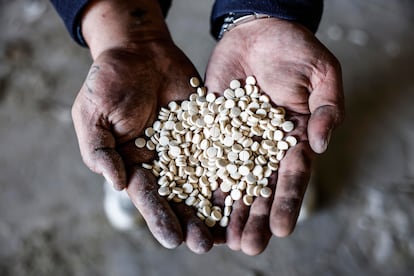

It was an open secret that, in the face of international sanctions, the now-deposed regime of Bashar al-Assad had turned Syria into a narco-state with the production and smuggling of captagon, a cheap and easy-to-produce drug nicknamed “poor man’s cocaine.” It was also an open secret that Maher, the dictator’s younger brother, whose whereabouts are now unknown, oversaw a business that, according to research by the New Lines Institute in New York, generated $2.4 billion annually. This money flowed into a system where corruption was not the exception, but the norm.
Maher al-Assad commanded the Army’s Fourth Armored Division and was, in effect, the second most powerful man in the country. Rebel fighter Baker Sham knew all this, but is still shocked by the scale of the operation, as he displays how the drug was produced, packaged, and hidden inside wooden tables, decorative plastic fruit, LED lights, and electric generators at a center on the outskirts of Damascus. “What we found when we arrived would have sold for millions of dollars on the market,” says Sham, as he picks up the slats from the ground to turn the liquid mixture into pills and 100-gram bags of hashish. Assad’s Syria accounted for 80% of the world’s captagon production, according to U.N. estimates.
The rebels found the clandestine drug laboratory in Maarounah, about 20 kilometers (12.4 miles) from the capital, Damascus. It is a large two-story industrial plant that until 2018 produced chips and whose floor today contains thousands of captagon tablets, hastily abandoned in the face of the rapid rebel advance, which destroyed the regime at the beginning of the month in just a week and a half.
“Syria has become the largest producer of captagon on Earth […] and today, it will be purified by the grace of God Almighty,” said Ahmed al-Sharaa, the leader of Hay’at Tahrir al-Sham (HTS), the Islamic fundamentalist group that led the overthrow and sees drugs as proof of the moral misery of the regime. The new authorities have set fire to large quantities of hashish and at least a million captagon tablets. Producing them cost a few cents. They were sold in a price range of $3 to $20.
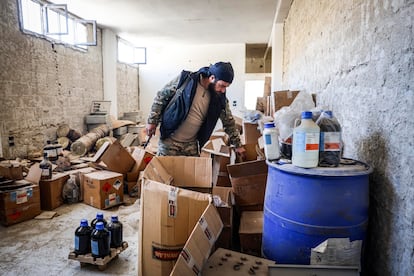
One room has a black ceiling and smells of burning. “When we arrived, there was no one here. They had all fled shortly before, setting fire to the hashish they stored here,” the fighter said. This is not the only captagon factory discovered after the regime was overthrown. Others were found in a car sales company in the coastal city of Latakia, a building at the Mazzeh air base in Damascus, or a mansion near the capital.
Captagon is the former trade name for fenetylline, a psychostimulant that was first developed in Germany in the 1960s to treat narcolepsy, depression, and attention deficit hyperactivity disorder. It was smuggled into the Middle East from Eastern Europe in the 2000s, shifting the focus of the drug. While most European countries had been banning it since the 1980s, after discovering that it was highly addictive, it was already becoming popular in the Middle East, especially among combatants in battle. For years, it was known as the “jihad drug.”
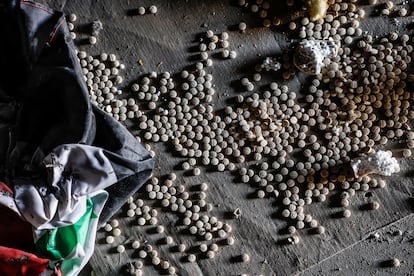
At the exit of the factory, a military vehicle with a machine gun and Aleppo license plates shows that the facility is now in the hands of the rebels. Next to it, there is a truck carrying goods. It never got to transport the drugs in the boxes of tea and nuts that had been prepared.
For years, the activities inside the plant were protected by two walls. One physical, made of concrete, and the other, of silence, about a deal that Assad used with the Arab countries as a negotiating trump card to fulfill his dream: to return to international forums as the virtual winner of the war and obtain the lifting of sanctions. In the last five years, the regime controlled 70% of Syrian territory, including coastal ports and at least part of all its borders with Jordan, Turkey, Lebanon, Iraq, and Israel. There are 370 kilometers (230 miles) of dividing lines.
The main destination was the Gulf, especially Saudi Arabia, where up to 67% of the total arrived. And the main transit routes, by sea and land, were through neighboring Jordan and Lebanon. The drug sometimes made a detour through southern Europe before reaching the Gulf, but it rarely stayed there. It usually ended up in Arab countries, so captagon trafficking was less of a global issue.
Amman and Riyadh were worried and asked for help from their allies — the United States and the United Kingdom — which imposed sanctions in 2022 on businessmen and other regime figures involved in captagon trafficking. The drug trade promoted by Assad affected their youth and borders. Saudi authorities admitted years ago that the main consumers of the drug were aged between 12 and 22.
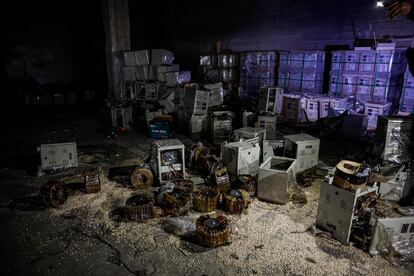
In an interview in the Jordanian capital in October 2023, a young former captagon addict, Mohamed, recounted his experience. Without giving his last name or being photographed, he said that he started taking it at university, where it was very popular among young people from different social classes. For the poorest, it was relatively cheap. For those who, like him, came from wealthier families, it was accessible. Both took it mainly for sex (because the idea that it improved duration and performance became widespread) and to perform in studies. It was commonly used to endure the study binges before an exam, he said. It was also popular among taxi drivers and VTC drivers who worked the night shift.
In 2021, Riyadh even banned all imports of Lebanese products to prevent the illegal entry of captagon. That year, it confiscated 86 tons of amphetamines, twice as much as the previous year. The Arab countries, which had begun the process of normalization with Assad, raised the issue in talks with their Syrian interlocutors and received promises that later came to nothing.
May 2023 marked a turning point. The Jordanian military launched its first airstrikes inside Syria to stop production. In one, it killed Marai al-Ramthan, a known drug lord who coordinated trafficking.
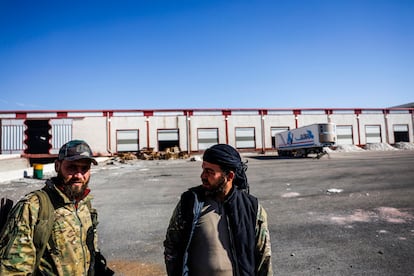
That same month, the Arab League re-admitted Syria, 12 years after suspending it for its repression of peaceful protests — within the framework of the Arab Spring — which led to almost 14 years of civil war. Assad was the same Assad in 2011 and the day he returned, relaxed and smiling, to the Arab League fold, but the apparent stabilization of the front (the rebels were secretly preparing the offensive in Idlib), the rush to get rid of the refugees, realpolitik, the desire to combat the influence of Iran and, of course, captagon, weighed more heavily in the Arab countries. A ministerial contact committee was created with representatives from Egypt, Iraq, Jordan, Saudi Arabia, and Syria, with four tasks. Among them was reducing the production and smuggling of captagon.
Trafficking continued as if nothing had happened. It has only collapsed now, with the fall of the regime. A senior Jordanian military officer explained to this newspaper last year how it was smuggled in. The main route was hidden in legal export shipments. That’s how the drugs left the factory in Maarounah. But as surveillance increased, drug traffickers also resorted to formulas such as hiding it inside drones and flying them, at low altitude, to the other side of the border with Jordan.
Experts spoke of a decentralized structure, with different actors enriching themselves in parallel, without a clear hierarchy. Saudi Arabia, for example, seized eight million captagon pills the same month it hosted the Arab League summit that readmitted Syria.
The fall of the regime has dealt a mortal blow to captagon trafficking, but the risk now — with demand and routes created — is that it will simply be diverted. For example, to neighboring Iraq, where authorities seized 4.1 tons of captagon pills in 2023, almost 34 times more than four years earlier, according to a report by the United Nations Office on Drugs and Crime. The report recalls that Iraq could “become an important node” of global drug trafficking, as it is located at the intersection of major routes. At the moment, the number of people in the country with drug use disorders doubled between 2017 and 2021.
Sign up for our weekly newsletter to get more English-language news coverage from EL PAÍS USA Edition
Tu suscripción se está usando en otro dispositivo
¿Quieres añadir otro usuario a tu suscripción?
Si continúas leyendo en este dispositivo, no se podrá leer en el otro.
FlechaTu suscripción se está usando en otro dispositivo y solo puedes acceder a EL PAÍS desde un dispositivo a la vez.
Si quieres compartir tu cuenta, cambia tu suscripción a la modalidad Premium, así podrás añadir otro usuario. Cada uno accederá con su propia cuenta de email, lo que os permitirá personalizar vuestra experiencia en EL PAÍS.
¿Tienes una suscripción de empresa? Accede aquí para contratar más cuentas.
En el caso de no saber quién está usando tu cuenta, te recomendamos cambiar tu contraseña aquí.
Si decides continuar compartiendo tu cuenta, este mensaje se mostrará en tu dispositivo y en el de la otra persona que está usando tu cuenta de forma indefinida, afectando a tu experiencia de lectura. Puedes consultar aquí los términos y condiciones de la suscripción digital.








































